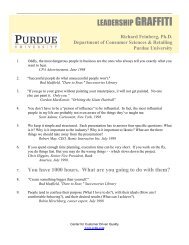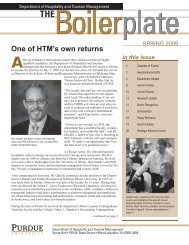alumni news - College of Health and Human Sciences - Purdue ...
alumni news - College of Health and Human Sciences - Purdue ...
alumni news - College of Health and Human Sciences - Purdue ...
Create successful ePaper yourself
Turn your PDF publications into a flip-book with our unique Google optimized e-Paper software.
Growing Up, Not Apart<br />
Researcher examines ties<br />
between adult children <strong>and</strong> parents<br />
Relationships between parents <strong>and</strong><br />
their children are among the<br />
longest lasting. While marriages<br />
can dissolve <strong>and</strong> friendships can fade,<br />
the ties between a parent <strong>and</strong> child<br />
endure — sometimes despite distance,<br />
conflicting dem<strong>and</strong>s, <strong>and</strong> differences <strong>of</strong><br />
opinions. As parents <strong>and</strong> their children<br />
age, the dynamics <strong>of</strong> the relationship<br />
change, but the bond between the generations<br />
matures <strong>and</strong> grows, <strong>and</strong> can<br />
create what Karen Fingerman, PhD,<br />
associate pr<strong>of</strong>essor in the Department<br />
<strong>of</strong> Child Development <strong>and</strong> Family Studies,<br />
calls a “distant intimacy.”<br />
“There are no social or legal sanctions<br />
that make you keep in touch with<br />
your parents,” says Fingerman. “I’m<br />
interested in how people keep these<br />
relationships going, especially when<br />
parents <strong>and</strong> their grown children are<br />
separated by distance. I wanted to<br />
explore how parents <strong>and</strong> <strong>of</strong>fspring keep<br />
connected, what kinds <strong>of</strong> problems they<br />
face, <strong>and</strong> what their worries are.”<br />
With nearly half <strong>of</strong> American adults<br />
residing more than 50 miles from their<br />
parents, Fingerman sought to discover<br />
how geographic distance affected their<br />
ability to engage in emotional <strong>and</strong> functional<br />
exchanges with their parents.<br />
In the study, funded by the<br />
National Institutes <strong>of</strong> <strong>Health</strong>, Fingerman<br />
says she expected to find that the greatest<br />
challenges facing adult children <strong>and</strong><br />
their parents who live far away would<br />
8 focus: Consumer <strong>and</strong> Family <strong>Sciences</strong><br />
be the inability to provide functional<br />
support for each other. This might<br />
include gr<strong>and</strong>parents providing child<br />
care for gr<strong>and</strong>children or adult children<br />
helping aging parents with tasks around<br />
the home.<br />
“Surprisingly, we found that for<br />
most adults the greatest challenge was<br />
the inability to engage in face-to-face<br />
contact with their parents,” she says.<br />
“We really thought it would be about<br />
the amount <strong>of</strong> help that children <strong>and</strong><br />
their parents could provide to each<br />
other, but you can compensate for that.<br />
You can find someone to watch your<br />
kids or do your yard work. You can’t<br />
find someone to be your parent or your<br />
son or daughter.”<br />
Despite the lack <strong>of</strong> physical contact,<br />
the majority <strong>of</strong> adult children <strong>and</strong><br />
parents who live long distances from<br />
each other consider their relationship<br />
close. According to Fingerman, intimacy<br />
between aging parents <strong>and</strong> grown children<br />
is defined by two characteristics:<br />
recognition <strong>of</strong> the other person as an<br />
individual with strengths <strong>and</strong> weaknesses,<br />
<strong>and</strong> a deep concern for the<br />
other party’s well being.<br />
“Although parents <strong>and</strong> <strong>of</strong>fspring<br />
who reside at a distance cannot actively<br />
participate in one another’s day-to-day<br />
lives, they may still experience a sense<br />
<strong>of</strong> intimacy,” she says. “Geographic<br />
separation is not a barrier to close<br />
relationships.”<br />
research<br />
Adults who live far from their parents reported<br />
talking to them on the phone one to two times<br />
per week.<br />
Findings from Fingerman’s study<br />
suggest that adults who live far from<br />
parents find ways to compensate for<br />
the distance. For example, adults talked<br />
with their parents on the phone an<br />
average <strong>of</strong> one to two times a week.<br />
Despite being able to keep in<br />
touch via the telephone <strong>and</strong> e-mail,<br />
most adults in the study wished they<br />
lived closer to their parents <strong>and</strong> that<br />
they could see each other more <strong>of</strong>ten.<br />
“It’s interesting that despite all the<br />
means there are to keep in touch, people<br />
still miss the visual element,” she<br />
says. “Many <strong>of</strong> us do live far from our<br />
parents, so that really hit home.” ■<br />
Karen Fingerman is the Berner Hanley University<br />
Scholar <strong>and</strong> an associate pr<strong>of</strong>essor <strong>of</strong> develop-<br />
mental <strong>and</strong> family studies. She has researched<br />
the ties between adult children <strong>and</strong> parents for<br />
the past 10 years, including the mother-daughter<br />
relationship <strong>and</strong> the relationship between<br />
engaged adults <strong>and</strong> their prospective in-laws. To<br />
contact Fingerman, call (765) 496-6378 or e-mail<br />
karenf@purdue.edu.












